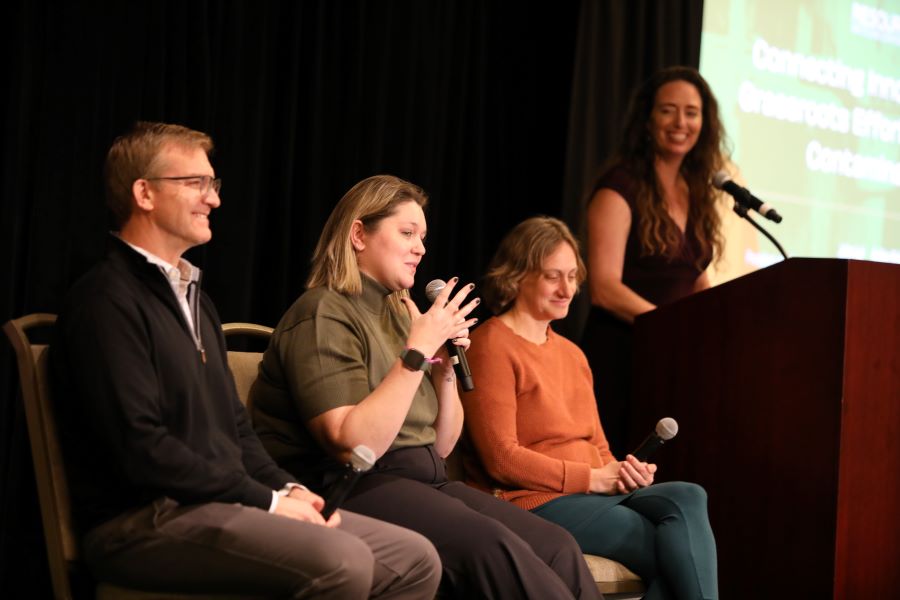
The annual Resource Recycling Conference in Louisville, Kentucky, drew more than 300 registered attendees to sessions including “Connecting Innovation and Grassroots Efforts to Curtail Contamination.” | Dan Holtmeyer/Resource Recycling, Inc.
The 2024 Resource Recycling Conference kicked off Wednesday, bringing hundreds of recycling program managers, advocates and other experts to share successes and lessons from across the country.
The first day in Louisville, Kentucky, touched on such wide-ranging topics as deposit and extended producer responsibility systems, residential food scrap collection, working with the news media and contamination.
Even more topics are on the table for the rest of the conference, with sessions on textiles, resident education, end-market development and more. As several speakers said, the field of community recycling is always changing and growing.
“The minute you think you’re a subject matter expert, a new law is in place and you have to create new programs,” Leslie Lukacs, executive director of Zero Waste Sonoma, said during the conference opener.
‘Keep doing what you know to be right’
The opening plenary session featured women leaders in sustainability who have been highlighted in moderator MaryEllen Etienne’s recurring “Women in Circularity” feature that appears on a dedicated website and in Resource Recycling.
The panelists discussed their own varied backgrounds before entering the industry. Crystal Dreisbach, CEO of reuse-focused Upstream, emphasized it’s important to ensure the next generation can succeed. Although there are often job openings in the sustainability space, she noted organizations often end up poaching established sustainability leaders from each other. It’s logical to want to hire experts, but Dreisbach advised companies to focus on new blood. One way is to create internships.
“It is a lot of work to host interns, you have to mentor and coach and handhold a lot of times, but the payoff is huge,” Dreisbach said.
Along those same lines, Stacy Savage, founder and CEO of Zero Waste Strategies, said older generations need to start taking Generation Z seriously. She said it feels like young people are not being given the same chances.
“People in the older generations were given the opportunity to lead at very young ages,” she said. She advised current leaders to give young employees chances by “bringing them into the fold, incorporating their ideas – collaboration is key – and giving them the opportunity to lead.”
The panel also discussed the challenges of working in a dynamic field like sustainability and recycling, especially amid a rapidly-changing regulatory environment.
There are frequently unforeseen challenges. Lukacs at Zero Waste Sonoma described her organization’s push to create EPR for marine flares, which can’t be safely disposed of in any way currently. The bill received 100% support in the state House and Senate – from a bipartisan group of lawmakers – sending the bill to Gov. Gavin Newsom’s desk. Then he vetoed it.
Lukacs and other stakeholders figured out the technicalities that led to Newsom’s veto and even came to agree with his decision. They plan to return next year with a revised proposal.
All of that speaks to the need for sustainability leaders to practice persistence, the panel agreed.
“I’m in my fourteenth year of working against a system of waste that has been cemented as a cultural norm,” said Dreisbach. Sustainability advocates must persist, she added, “because if you keep doing what you know to be right, and you get 10,000 hours or more of that, you become an expert in that thing, whatever it is, and you can make change.”
Curtailing contamination
Ongoing and continuous customer education and communication is vital to further grassroots recycling efforts, according to several panelists at another session.
The city of Louisville, Kentucky, uses a system that includes “oops!” tags, to notify residents of contaminants including bagged items, EPS foam and big items or tanglers, said Karen Maynard, solid waste education manager for Louisville Metro Government. The city also distributes “way to know” tags to reinforce residents’ good habits. As a result, the city has noted a 37% decrease in contaminants and an increased recovery rate at the MRF.
In Florida, Pinellas County found that data analytics can indicate which promotional platforms would be most effective in reaching residents, said Ashley Wayland, environmental outreach specialist. For example, developing an ad that causes an emotional connection with the viewer performs well, and so the county is using paid ads on Facebook and Instagram to target specific groups, such as dog owners or cyclists, and focusing on persuadable residents as a whole.
Proactive communication is proving effective in Salt Lake City, said John Lair, president and CEO of Momentum Recycling, which uses various technologies to track collection trucks and prepare monthly diversion reports for commercial customers, among other tasks. An app called Recycle Coach can send automated collection-day reminders to improve cart set-out rates, including for monthly glass pickup service, for example. In addition, when a customer fails to set out their bin four times in a row, this triggers an alert to account managers, which has reduced cancellations.
“It’s all about proactively getting information at our fingertips so we can keep these customers recycling,” Lair said.

